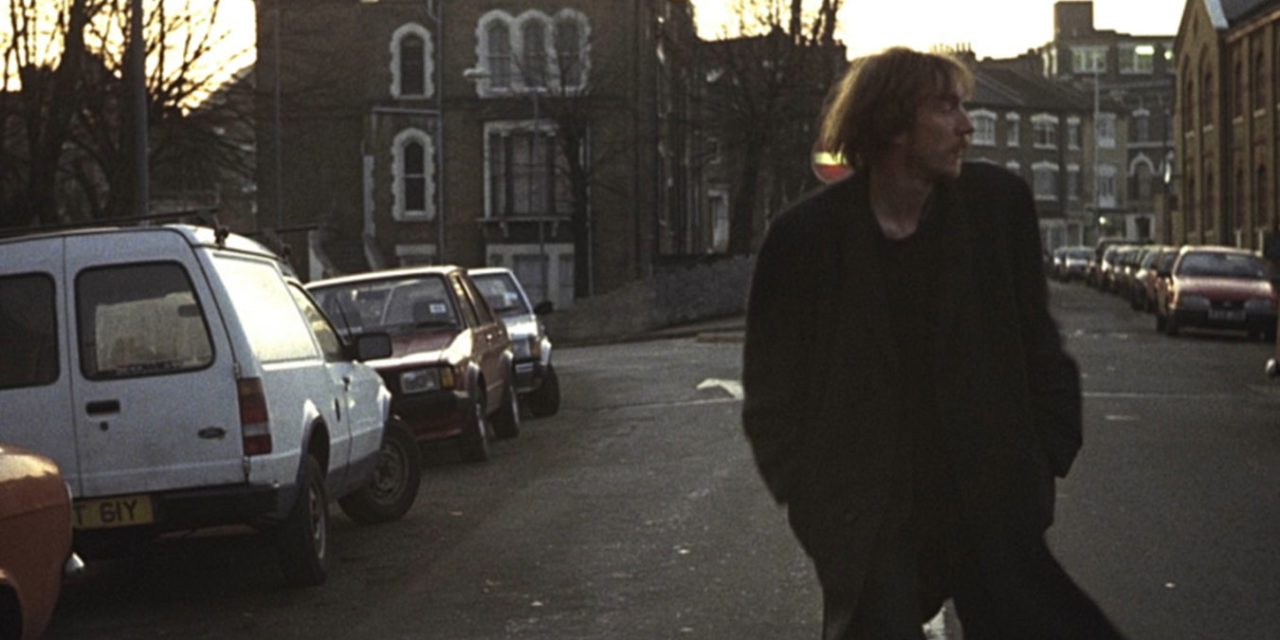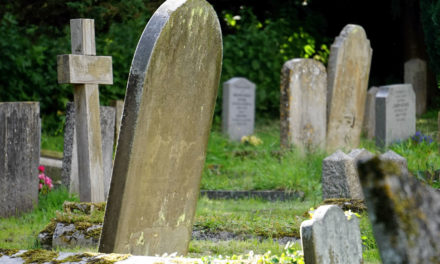Unknown to a lot of people, these four British films have an important message and tell us something important about the way things are in this country, which is often a bitter pill to swallow.
The Servant 1963
First up is Joseph Losey’s the Servant made in 1963. A review in the New York Times called the Servant “the coldest film ever made”. The Servant is indeed bleak. Set over a freezing London winter (1963 was one of the coldest years in record in the UK in the last 100 years), the film is a study of the English class system at its worst, of upper class impotence and indolence, working class shame and the dynamics of personal and sexual power in the master servant relationship.
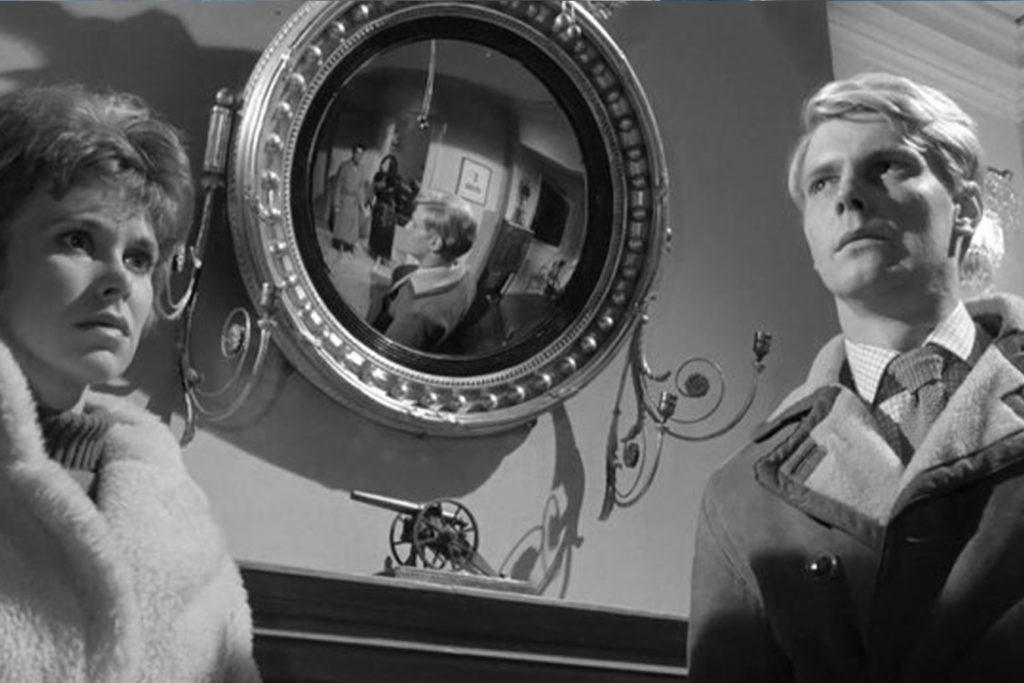
James Fox plays Tony, a spoilt upper-class layabout in desperate need of someone to look after him and wash his socks. He hires Barrett, superbly played by Dirk Bogarde, the devious gentleman’s gentleman determined to dominate and control his employer. Bogarde puts on a Manchester accent and immediately the British viewer can place him as a lower-middle class snob (snobbery in British society is by no means reserved for the upper-classes) who is deeply envious of his master Tony and is determined to muck things up for him.
To a neutral observer, Tony it would seem, has little to be envious of. He is lazy, without direction and is developing quite an alcohol problem, but to a British audience his plummy upper-class accent and his town house in Chelsea are all it takes to invoke all sorts of envious as well as obsequious emotions.
At the beginning of the film we see Tony, the aristocrat, passed out in a camping chair sleeping off too many beers at lunch and this is when he first meets Barrett his future manservant. Initially Tony is in charge, but this soon begins to change. As the emotional mind games escalate, Barrett slowly becomes master of the house.
What an American reviewer who praised the film, perhaps does not understand in its ghastly entirety, is that although by the end of the film Barrett is in charge, he remains in terms of class, a servant. Although he has usurped his master, he’s done so by deception, malice and trickery. A British audience depressingly understands that, do what you will, the class system is virtually impossible to change. Barrett may be master of the house and in charge, but he will always be envious of his housemate for no other reason than said housemate is an aristocrat and speaks in a posh voice.
The Servant is superbly put together and as well as the bubbling class issues, it also has an elusive gay gene. The relationship between servant and master is deliberately opaque, homosexuality is everywhere and nowhere.
The menacing dialogue between the two men hints, implies, seduces and repulses. Nothing is said overtly as in 1963 homosexuality was still a criminal offence and representing homosexuality on screen was illegal. Yet by the end of the film, Tony’s finance has been forced away, usurped by Barrett.
It is perhaps no coincidence that a year before the Servant Dirk Bogarde played a homosexual judge in the Victim and came out as a gay man when homosexual sex was legalised in 1967. The manipulation of Tony by Barrett is about power but also about pleasure and sexuality.
The director Joseph Losey was an American expat who had lived in the UK for some time by the time he made the Servant. With the eyes of a knowledgeable outsider, he manages to show that the English rhetoric of class and sex was largely in code. But in the Servant, with its dark shadows and faces distorted in convex mirrors, it remains a deceitful code that does its participants no good at all.
The Remains of the Day 1993
The Remains of the Day was also directed by an American at the top of his game, James Ivory. The film is an adaptation of the book by Kazuo Ishiguro, which won the Booker Prize and here again two outsiders manage to successfully show the flawed aspect to English culture that gets overlooked in the many English period dramas that litter our screens.
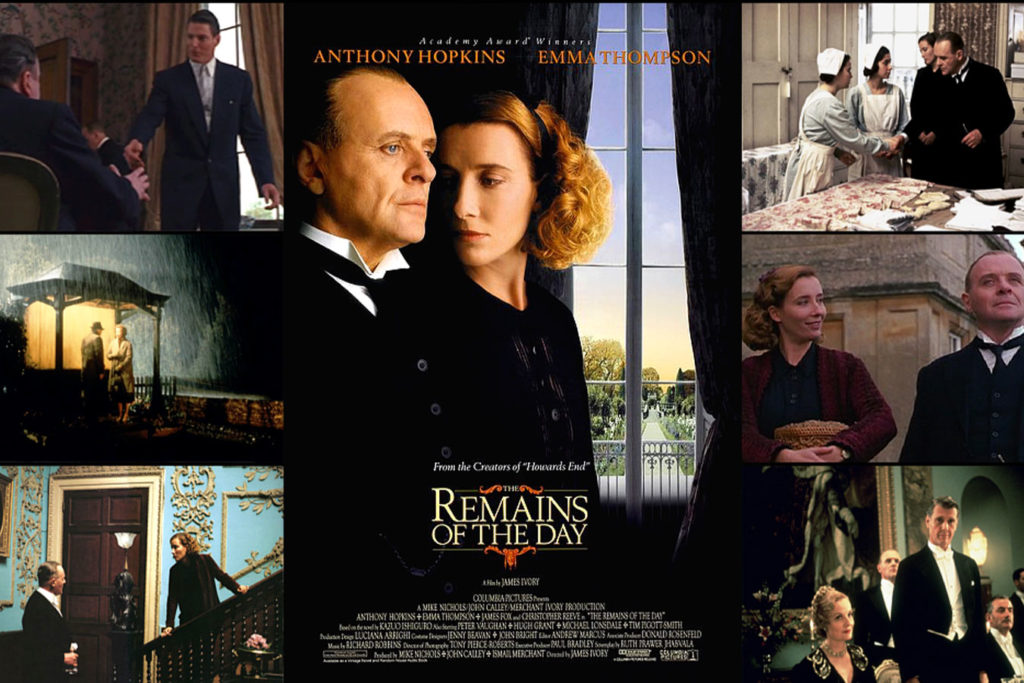
The Remains of the Day tells two stories at once. It begins in 1958 with an old man, Stephens, the butler at Darlington Hall, making an important journey to the sea in an old Daimler. He is going to see a woman, Miss Kenton, who he has not seen for a long time and who we know used to be the housekeeper at Darlington Hall in the 1930s in the run up to the Second World War.
On his journey we see Stephens’ memories as a series of flashbacks of the great days of Darlington Hall in the 30s when the British Empire was still intact and Lord Darlington, the owner of the Hall, played host to many of the world’s leaders.
But we soon begin to realise that things are not what they seemed, that Lord Darlington was not as wise as Stephens thought, and that Stephens was blind to the reality around him. We find out that Lord Darlington had great sympathy for Nazi Germany, in a sentimental way based on a past friendship with a now dead German friend, and that he hopes to bring about a sperate peace with the appeasers of the time between Britain and Germany.
But later in the film we find out that Lord Darlington, as history showed, was deluded, short sighted and easily persuaded by his Nazi guests. Towards the beginning of the film he takes on two German Jewish girls who are refugees from Germany as maids, essentially giving them sanctuary. But then susceptible to the racism of his Nazi guests, turfs them out, knowing that doing so risks their deportation back to Germany where a bleak future awaits them.
The Remains of the Day is a film about society where tradition is valued above all else, even when that means repressing normal human feeling. Miss Kenton the housekeeper is clearly attracted to Stephens but although he is attracted to her as well, he is terrified of intimacy. He represses his own feelings and instead redoubles his fanatical devotion to his work, namely service to Lord Darlington.
Early in the film we meet Stephen’s father who is himself a butler and who brought up his son to have a rigid sense of service. Indeed, Stephen’s devotion to his master Lord Darlington is so great that even when his father is dying upstairs, Stephens does not stop serving the guests at an important dinner party.
Throughout the film Stephens buries his feelings and this is something that British people can identify with as a broad national characteristic and which has only begun to change relatively recently.
Depressed by Stephen’s continual rejection of her, Miss Kenton eventually leaves Darlington Hall and marries a man she clearly does not love, because being with someone is better than being with nobody at all.
As Stephens drives towards to the sea in his old Daimler, he hopes that Miss Kenton might still be interested in him and that he might, late in life, find the happiness he ran away from as a younger man.
But it is not to be, at the last-minute Miss Kenton changes her mind when she finds out she’s about to be a grandmother and Stephens is left on his own again. The Remains of the Day is a parable for those who put their emotional life on hold because they feel their duties are more important. Stephens has used his responsibilities as an excuse and has ended up a lonely, narrow man who will never experience the joys of life.
The film is subtle, things often take place in secret or hidden away in corners or in attics. This is deliberate and is reflective of English society at the time in an aristocrat’s large country house. It is perhaps no coincidence that the book on which the film is based was written by a Japanese author who moved to Britain when he was five and therefore has an intimate understanding of both cultures. Japanese and English society being at once so different and so similar in their adherence to silent tradition and unspoken codes of conduct.
If 1968
The natural antidote to an oppressive and rigid class structure is revolution and rebellion and Lindsay Anderson’s If offers just that. If is a tale of rebellion at British private school filmed and set in 1968, a year that saw huge protests by students across the world most notably against the Vietnam War in the USA and in France at various university campuses. But here’s the catch, If is also, at least in part, a fantasy, and although the adolescent rebellion of the three protagonists is important in terms of youth and what their protest stands for, in comparison to what was happening in other countries it is tame stuff.
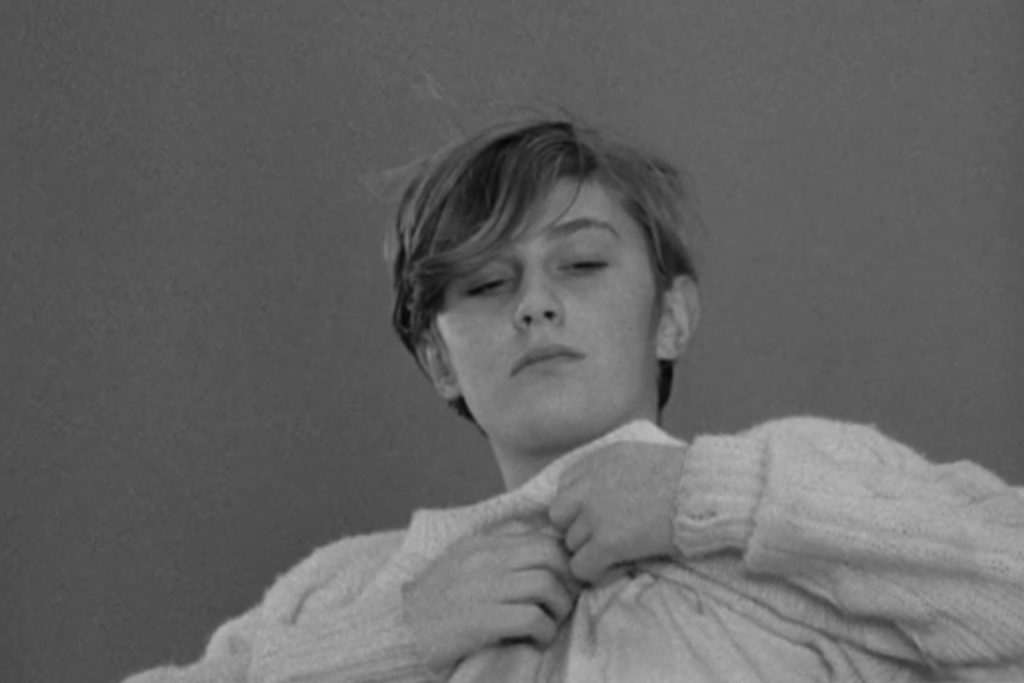
Although If takes place at the very heart of traditional British society and its message is revolutionary and anarchic, even a small rebellion at an English public school is something that has never happened and unless something radical changes never will. The clue is in the title.
From the very start the film functions as damning criticism of the English public school system, which stands as a metaphor for British society and the class system. 50 years later the substance of what we see in If hasn’t changed that much. Yes, there are a few more foreigners around but the top jobs in the UK are still predominately occupied by the English public school elite.
In If, three free thinking adolescents led by Mick Travis who is brilliantly played by Malcolm McDowell, rebel against the tiered school system where they are ruled over by unreasonable, domineering older boys known as ‘whips’ (the same word used for those given the task of implementing party discipline in the House of Commons).
The rebels take the consequences for their actions in the form of brutal corporal punishment, they are actually whipped by one of the ‘whips’, which in 1968 was still common in British schools. Towards the end of the film it is clear that the plot has swung into the realm of fantasy as the boys, finding a stash of guns and grenades in an old storeroom, fire upon teachers and parents during a ‘Founders Day’ celebration. The final scenes of the film are shot in a surreal way that suggests that this is a dream or some distorted version of reality.
If is also a film about the rebellious and revolutionary nature of sex, particularly in terms of the intense prudishness of an English public school in 1968. Travis has a relationship with a local waitress and his fellow rebel Wallace (note they are largely referred to by their surnames in the dehumanising public school fashion of the time) is deeply attracted to another younger boy. But once again, the exact nature of these relationships remains, in this film at least, the realm of fantasy.
While Anderson releases the destructive, pent up sexual energy so predominant in English public schools of the day, there is something unsettling about If. Perhaps it is the queasy acknowledgment among English viewers that in 50 years not enough has changed, just as I suspect Anderson knew in his heart it wouldn’t.
Naked 1993
After the past three carefully constructed class critiques, it is perhaps only right that I include a film which is brutal and raw and is set in a world of the dispossessed where the niceties of class are simply irrelevant next to the daily grind of survival. This film is Mike Leigh’s appropriately named Naked from 1993.
The protagonist is Jonny, played by David Thewlis in what is still regarded as his best performance to date. Jonny runs away to London from his native Manchester after committing what appears to be a sexual assault. He looks up an ex-girlfriend and then starts violently shagging her clingy room mate before getting bored and heading out into the night on a tour of London’s under class with its infinite denizens of washed out misery. Presented with all their human weaknesses on full display, Mike Leigh here is at the top of his game.
Jonny is man for whom life has become terminally sour. He likes no one but hates himself more. He treats women appallingly, often relapsing into sexual violence and misogyny. And yet Leigh also shows us a kinder side to him. He is perhaps just redeemable but not by any of the characters we meet in Naked.
It is hard to know pin down exactly why we empathise with Jonny, it might be because of his intelligence or because of his acerbic humour. Leigh deliberately contrasts him with a far more evil character, a yuppie known both as Jeremy and Sebastian who tramples over everyone, he meets to get what he wants. This is perhaps what Jonny might be like without intelligence, humour, poverty and desperation.
On the grimy streets of London, Jonny meets Archie and Maggie, the homeless Scots who keep losing each other, a middle aged security guard who gets through the tedium of his job by dreaming of his retirement, which he confuses with a past life and two lost women, one an ageing alcoholic, the other a drifting depressive, and Jonny while stopping short of rape abuses both of them physically and mentally.
Most of the characters in the previous three films I have discussed would barely recognise the ensemble in Naked, with the exception of butler Barrett who would cross the road in disgust.
Naked feels like dangerous film making where the characters are pushed right to the edge of what is acceptable to an audience. But along with its verbal violence it is also painfully funny and is able to manage dark comic entertainment at the same time as drawing blood.
Naked is what happens when people are stripped of their protective layer of civility and compassion. Naked presents a part of society that Margaret Thatcher claimed doesn’t exist and despite the swearing and the violence and the lack of hope gives them a formidable dignity. Mike Leigh’s Naked is, in terms of film making and what it wants and manages to do, the revolution that Lyndsay Anderson’s If failed to be.
Main Photo of Jonny in Naked from Celluloid Heaven
- Why is California So at Risk from Wildfires? - 13th November 2019
- Carbon Offsetting is Growing but Does it Make a Difference? - 11th November 2019
- Three Confirmed Dead as Australia Prepares for “Catastrophic” Bushfires - 11th November 2019

